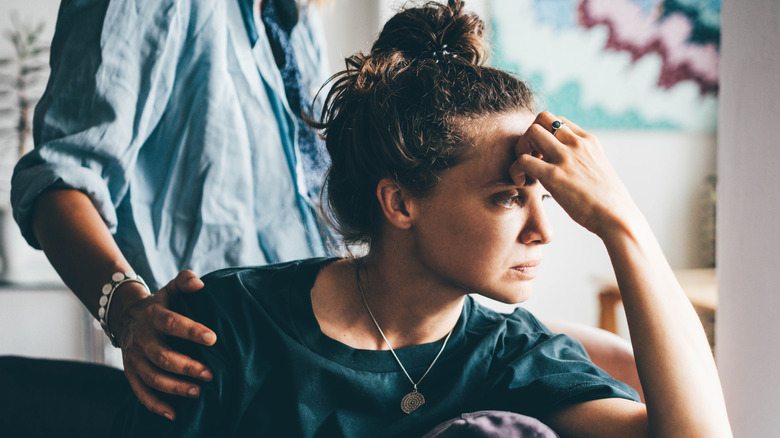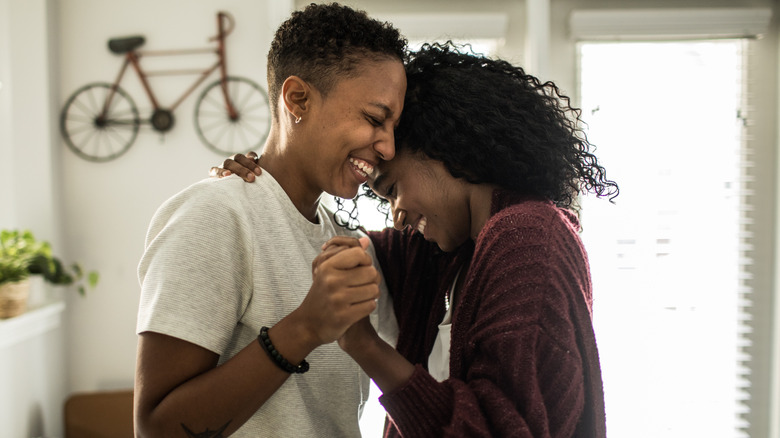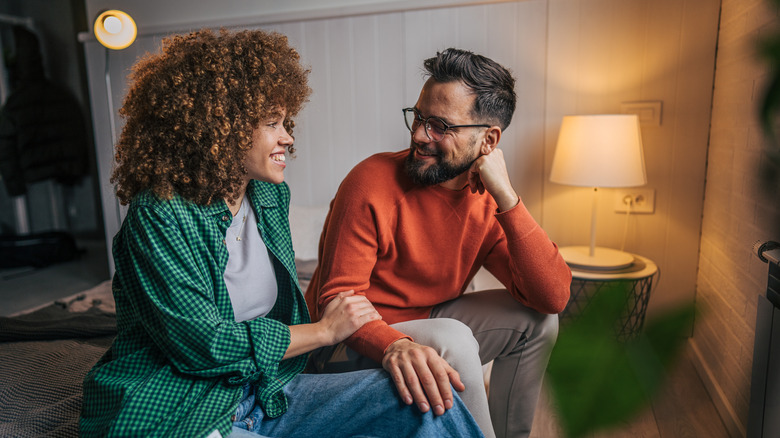What Is 'Floodlighting' And How Can You Look Out For This Toxic Behavior In Your Dating Life?
If you thought you were going to get through 2025 unscathed by toxic dating behavior, you were wrong — there's another harmful dating trend on the rise that you need to know about. This time, we're dealing with floodlighting. While it might sound relatively harmless, when we break it down, it's anything but that.
Coined by author of "The Power of Vulnerability: Teachings of Authenticity, Connections and Courage," Brené Brown, floodlighting is along the same lines as trauma-dumping. But instead of waiting until well into a relationship to reveal certain things, people who engage in floodlighting just put it all out there way too soon. "Floodlighting can be a way to push for intimate connection before it can naturally develop," Judith Aronowitz, RN, LCSW, exclusively tells Women, adding that people who have worked through their trauma struggle to build healthy connections. "[They] may yearn for closeness and may reveal too much, too soon. It isn't always intentional, but it is usually a problem."
As Aronowitz explains, if you're on the receiving end of this behavior, it creates a false sense of intimacy and can be overwhelming, especially because trust hasn't been developed yet. For those who use floodlighting as a way to fast-track a relationship and keep people around, it's often about getting reassurance and preventing rejection through the means of pity. Floodlighting, no matter how you slice it, is toxic, and it's absolutely something you should be on the lookout for.
If you're getting too much personal information too fast, it's a red flag
Although whirlwind romances sound fantastically fun, ultimately, long-lasting relationships are all about building trust and getting to safely and authentically know each other. If someone isn't taking this route, it's a major sign of poor boundaries. It could also be a way of them testing what you're able to handle, which, of course, isn't a good idea either.
"[If] someone is sharing too much, the other may not know how to respond or manage their feelings and emotions with someone they don't know at all," warns Judith Aronowitz. "It can lead to uneven power dynamics. Oversharing may leave the sharer too open and unprotected, leading to feeling too vulnerable too early in the relationship. An imbalance can get created where the person sharing is more fragile and the other seen as a caretaker." It's hard to have an equal and healthy relationship if you find yourself parenting your partner.
To help prevent this, if the person you're dating is oversharing personal things too soon, set boundaries. "You can start by validating an experience, like 'that must have been hard, painful, difficult for you.' You could ask if they are sure they want to share these experiences now, as we don't really know each other that well," says Aronowitz, adding that steering things toward more neutral topics can get things back on track.
You want to evolve together in sharing things at the same pace
There's a widespread misconception that immediate intimacy somehow equals immediate closeness, but that's not the case. "If someone wants to share their life and feels close to you, they will share slowly and appropriately as time unfolds and a trust develops," says Judith Aronowitz. "Usually, there is mutual sharing, and it isn't one-sided. The sharing is thoughtful and done with emotional intelligence and awareness of timing and pace."
If you realize you're the one doing the floodlighting, figure out why you feel the need to share such information. Is it to create a quicker connection, or have your life validated? "Try and slow down before you share your story," says Aronowitz. "Allow the relationship to grow and deserve your vulnerability. Establish good boundaries with yourself and decide what to share. Protect your story and wait to share intimate details about your inner life when you know someone is trustworthy and safe."
While you may feel comfortable being candid early on in a relationship, you need to consider the feelings of those around you. "Find ways to regulate your anxiety and fears," says Aronowitz, adding that painful and traumatic experiences can be helped by a therapist. "This will give you clarity and self awareness can build," says Aronowitz. "Practice good self-care and self-love instead of seeking it externally." After all, it's in finding peace within ourselves that we're able to connect with others in healthier, happier ways.


